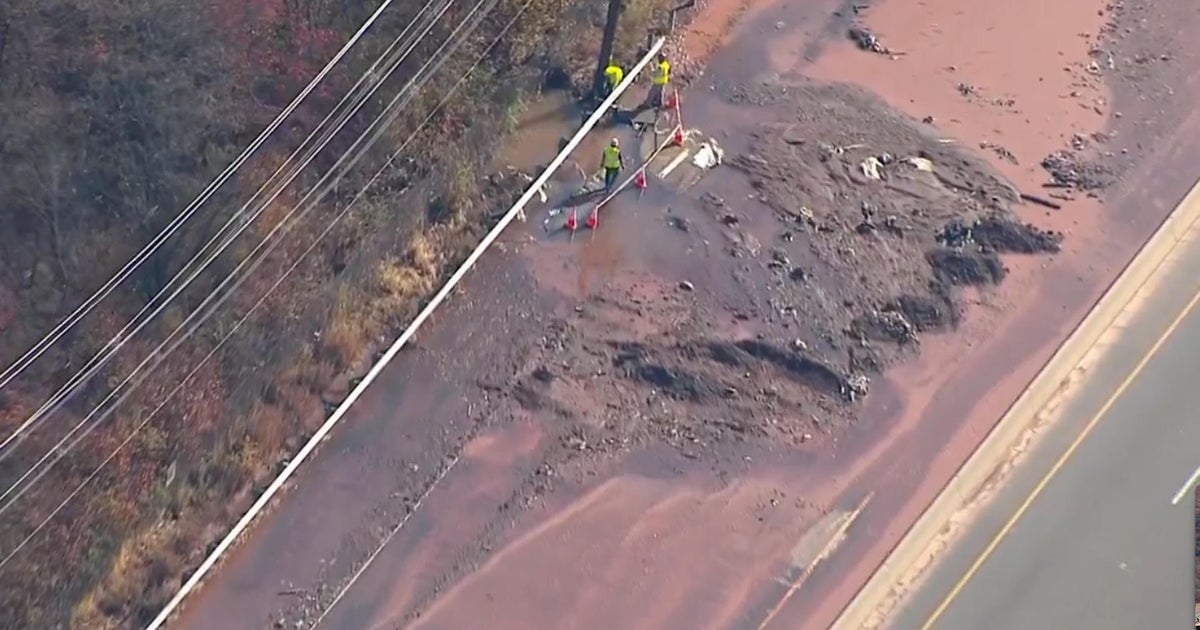Massachusetts
I-Team: School construction inequities in Massachusetts

BOSTON – In the affluent suburb of Westwood, its new state-of-the-art elementary school is under construction. The cost to build it is nearly $88 million. Cassandra Cruikshank tells the I-Team, “I teach in a brand-new building now, and I have seen personally the difference that it makes for students.”
But Cassandra’s own children are not in a new school. Her two boys were students at the Winter Hill Community Innovation School in Somerville. In May, a piece of concrete fell from a ceiling stairwell that kids use. The city deemed the building unsafe and closed it before the end of the academic year, displacing hundreds of students. Cassandra says, “It’s pretty scary to think about my kids being in a building that might really put them in danger.”
Deans at the school say they have been sounding the alarm about the problems for years. Brandon Buckland, a dean of students, says, “This is a failure of adults and of leadership to foresee a crisis that was being warned about.”
Some parents say it comes down to lack of equity in addressing the concerns. Uma Murugan, the president of the PTA, states, “most of us are immigrants, a lot of us don’t have political capacity at all or voices.”
To add insult to injury, Somerville decided to move the Winter Hill students to an even older school, the Edgerly, a so-called “swing school.”
But before the kids could even get inside the Edgerly, workers found asbestos. The abatement process nearly derailed the plan and raised questions about fairness. “I think kids can learn because kids will learn from the community, not from the building, but that said, I think kids deserve better than another old building that is almost falling apart,” Murugan said.
There are more than 1800 schools in the Commonwealth. Many of those in poor districts are old and in disrepair.
Communities that want to build new facilities can apply to the Massachusetts School Building Authority (MSBA) for aid. The quasi-state agency is funded by one percent of the state’s sales tax.
The agency decides how much it will reimburse a district for construction using a sliding scale formula that looks at community income, property values, and poverty. Cities and towns then have to come up with the rest of the money.
Senator Jason Lewis, who chairs the Education Committee, expressed a need for more state help. Lewis has filed a bill to create a commission to inventory how many schools need fixing and make recommendations on how to get MSBA more funding. He says that the cost of renovating and constructing schools has increased dramatically in recent years, and the MSBA’s reimbursement rate hasn’t kept up. This disadvantages less wealthy communities.
MSBA projects are greenlit largely based on urgency and need and do not specifically consider race. However, MSBA data from 2007 to 2022, as analyzed by the I-Team, shows that districts with more than 50% White students received more money for big projects, over $10,000 per student, compared to less than $6,800 per student in majority-minority communities.
Cassandra Cruikshank says all kids need a good learning environment that’s not hot, cramped, falling apart, and unsafe.
In Somerville, the city recently got a new high school and is on the hook to pay 25% of the estimated $256 million cost. The city has applied to the MSBA for funding to build a new Winter Hill school but would likely need voter approval for another tax increase.
Uma Murugan says in marginalized communities many immigrants don’t vote or participate in the process, leaving those families who need new schools the most unable to have their voices heard.
Statement from the MSBA:
“The MSBA has always operated equitably, by utilizing all available resources to make a difference in the lives of students across Massachusetts. Since 2007, over $7.8 billion dollars of grants have been approved and currently there are over 300 school projects in progress across the Commonwealth. On a yearly basis, the MSBA reviews statements of interests filed by districts and completes an exhaustive due diligence process with a focus on need and urgency as outlined in our statute. The MSBA remains committed to continuing to use our resources to extend our reach and improve the educational environment for all communities.”

Massachusetts
Mass. gives noncompliant towns more time to meet MBTA zoning regulations

The Healey administration filed emergency regulations late Tuesday afternoon to implement the controversial law meant to spur greater housing production, after Massachusetts’ highest court struck down the last pass at drafting those rules.
The Supreme Judicial Court upheld the MBTA Communities Act as a constitutional law last week, but said it was “ineffective” until the governor’s Executive Office of Housing and Livable Communities promulgated new guidelines. The court said EOHLC did not follow state law when creating the regulations the first time around, rendering them “presently unenforceable.”
The emergency regulations filed Tuesday are in effect for 90 days. Over the next three months, EOHLC intends to adopt permanent guidelines following a public comment period, before the expiration of the temporary procedures, a release from the office said.
“The emergency regulations do not substantively change the law’s zoning requirements and do not affect any determinations of compliance that have been already issued by EOHLC. The regulations do provide additional time for MBTA communities that failed to meet prior deadlines to come into compliance with the law,” the press release said.
Massachusetts’ Supreme Judicial Court ruled that the state’s attorney general has the power to enforce the MBTA Communities Law, which requires communities near MBTA services to zone for more multifamily housing, but it also ruled that existing guidelines aren’t enforceable.
Follow NBC10 Boston:
https://instagram.com/nbc10boston
https://tiktok.com/@nbc10boston
https://facebook.com/NBC10Boston
Tweets by NBC10Boston
https://bsky.app/profile/nbcboston.com
The MBTA Communities Act requires 177 municipalities that host or are adjacent to MBTA service to zone for multifamily housing by right in at least one district.
Cities and towns are classified in one of four categories, and there were different compliance deadlines in the original regulations promulgated by EOHLC: host to rapid transit service (deadline of Dec. 31, 2023), host to commuter rail service (deadline of Dec. 31, 2024), adjacent community (deadline of Dec. 31, 2024) and adjacent small town (deadline of Dec. 31, 2025).
Under the emergency regulations, communities that did not meet prior deadlines must submit a new action plan to the state with a plan to comply with the law by 11:59 p.m. on Feb. 13, 2025. These communities will then have until July 14, 2025, to submit a district compliance application to the state.
Communities designated as adjacent small towns still face the Dec. 31, 2025 deadline to adopt compliant zoning.
The town of Needham voted Tuesday on a special referendum over whether to re-zone the town for 3,000 more units of housing under Massachusetts’ MBTA Communities law.
Follow NBC10 Boston:
https://instagram.com/nbc10boston
https://tiktok.com/@nbc10boston
https://facebook.com/NBC10Boston
Tweets by NBC10Boston
https://bsky.app/profile/nbcboston.com
Like the old version of the guidelines, the new emergency regulations gives EOHLC the right to determine whether a city or town’s zoning provisions to allow for multi-family housing as of right are consistent with certain affordability requirements, and to determine what is a “reasonable size” for the multi-family zoning district.
The filing of emergency regulations comes six days after the SJC decision — though later than the governor’s office originally projected. Healey originally said her team would move to craft new regulations by the end of last week to plug the gap opened up by the ruling.
“These regulations will allow us to continue moving forward with implementation of the MBTA Communities Law, which will increase housing production and lower costs across the state,” Healey said in a statement Tuesday. “These regulations allow communities more time to come into compliance with the law, and we are committed to working with them to advance zoning plans that fit their unique needs.”
A total of 116 communities out of the 177 subject to the law have already adopted multi-family zoning districts to comply with the MBTA Communities Act, according to EOHLC.
Massachusetts
Revere city councilor slams Massachusetts officials for being ‘woke’ after migrant shelter bust

A Revere city councilor says the state’s right-to-shelter law is a “perfect example” of how “woke” ideologies are harmful, as he addressed the arrest of a migrant who allegedly had an AR-15 and 10 pounds of fentanyl at a local hotel.
Originally Published:
Massachusetts
Massachusetts senator seeks to extend deadline for TikTok ban | TechCrunch

Senatory Ed Markey (D-Mass.) is planning to introduce legislation to extend the TikTok ban deadline by 270 days. TikTok has warned of a looming shutdown in just five days, but the new legislation, officially called the Extend the TikTok Deadline Act, would give TikTok more time to divest from its Chinese parent company ByteDance, if approved by Congress.
TikTok is currently expected to “go dark” on January 19, unless the Supreme Court intervenes to delay the ban. The Supreme Court is weighing the ban, and is expected to decide sometime this week whether the law behind the ban violates the First Amendment.
“As the January 19th deadline approaches, TikTok creators and users across the nation are understandably alarmed,” Markey said in a Senate floor speech on Monday. “They are uncertain about the future of the platform, their accounts, and the vibrant online communities they have cultivated. “These communities cannot be replicated on another app. A ban would dismantle a one-of-a-kind informational and cultural ecosystem, silencing millions in the process.”
Markey noted that while TikTok has its problems and poses a “serious risk” to the privacy and mental health of young people, a ban “would impose serious consequences on millions of Americans who depend on the app for social connections and their economic livelihood.”
Markey and Senator Rand Paul (R-Ky.), along with Congressman Ro Khanna (CA-17), recently submitted a bipartisan amicus brief urging the Supreme Court to reverse the D.C. Circuit Court’s decision that upheld the TikTok ban. The trio argued that the TikTok ban conflicts with the First Amendment.
-

 Health1 week ago
Health1 week agoOzempic ‘microdosing’ is the new weight-loss trend: Should you try it?
-
/cdn.vox-cdn.com/uploads/chorus_asset/file/25822586/STK169_ZUCKERBERG_MAGA_STKS491_CVIRGINIA_A.jpg)
/cdn.vox-cdn.com/uploads/chorus_asset/file/25822586/STK169_ZUCKERBERG_MAGA_STKS491_CVIRGINIA_A.jpg) Technology6 days ago
Technology6 days agoMeta is highlighting a splintering global approach to online speech
-

 Science4 days ago
Science4 days agoMetro will offer free rides in L.A. through Sunday due to fires
-
/cdn.vox-cdn.com/uploads/chorus_asset/file/25821992/videoframe_720397.png)
/cdn.vox-cdn.com/uploads/chorus_asset/file/25821992/videoframe_720397.png) Technology1 week ago
Technology1 week agoLas Vegas police release ChatGPT logs from the suspect in the Cybertruck explosion
-

 Movie Reviews1 week ago
Movie Reviews1 week ago‘How to Make Millions Before Grandma Dies’ Review: Thai Oscar Entry Is a Disarmingly Sentimental Tear-Jerker
-

 Health1 week ago
Health1 week agoMichael J. Fox honored with Presidential Medal of Freedom for Parkinson’s research efforts
-

 Movie Reviews1 week ago
Movie Reviews1 week agoMovie Review: Millennials try to buy-in or opt-out of the “American Meltdown”
-

 News1 week ago
News1 week agoPhotos: Pacific Palisades Wildfire Engulfs Homes in an L.A. Neighborhood























